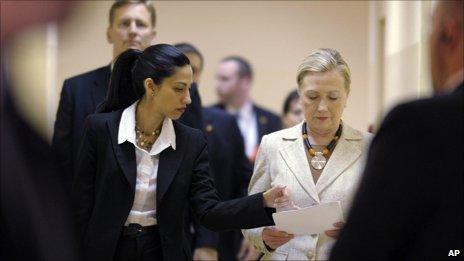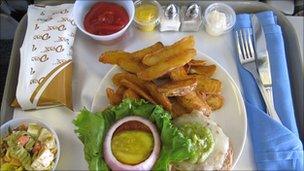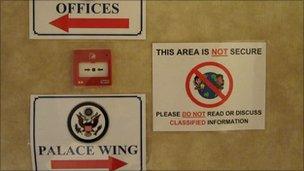On the road with Hillary Clinton
- Published

As US Secretary of State Hillary Clinton travels the globe, the reporters who join her can observe a small group of staff crafting foreign policy on the move - often after little or no sleep.
The Cadillac stops by the nose of the plane. Diplomatic security agents spill out of three vans. Hillary Clinton emerges from the car and walks up the steps.
After dropping off her handbag in her private cabin at the front of the plane, the US secretary of state walks back to chat with the dozen reporters on the plane.
Sitting on an arm rest, she tells us about her evening in the Rose Garden at the state dinner for German Chancellor Angela Merkel.
It was past 2300 on a recent June night, and Special Air Mission 883 was about to embark on a 30,000-mile journey to the United Arab Emirates, Zambia, Tanzania and Ethiopia, starting off with an air-force-catered meal of chicken wings and crudites.
For the next eight days I would be in "the bubble" - "a caravan going from place to place", as Mrs Clinton describes it.
"Sometimes the dogs bark but we still move on. It is for me, a movable adventure," she says.
This was my 16th trip with this American secretary of state, but being part of that bubble remains a special experience.
The proximity to Mrs Clinton, the access to senior American officials and the unguarded moments on the road, provide a rare insight into diplomacy in action and the real people devising American foreign policy.
Economy seats
Watching them try - and sometimes fail - to control the messy world around them is a reminder of the limits of American power.
On this trip I was given rare access to the preparations in Washington, the plane and pilots, and even to the "secure floor" set up in every hotel on the tour, with its guards, cameras and mobile offices.
It is an impressive operation run by an army of often earnest staffers with a keen eye for detail who say they feel part of history, even when they are sorting out mundane practicalities.
It can also be an unwieldy, invasive machine with diplomatic security agents, sniffer dogs and motorcades blocking off traffic in cities and disrupting people's lives.
We spend long hours in confined spaces, going from motorcade to hotel to presidential palace and back to the plane.

The journalists at the back of the plane get the same food as the secretary and her staff at the front
The journalists are crammed in the back, in economy seats. There are no boarding passes, so before the trip starts we draw lots to assign seats.
We are separated from the front of the plane by a lavatory that marks an invisible barrier called "the line of death". Beyond it are all the senior officials accompanying Mrs Clinton, usually poring over classified documents.
The plane is not fancy, nothing like Air Force One. The 13-year-old Boeing 757 is part of a fleet of four which is at the disposal of Mrs Clinton and others like the vice-president and the first lady.
The private cabin is modest - a fold-out couch, two seats, a desk, a lavatory but no shower, a tall mirror, a map of the world and communications equipment so Mrs Clinton can speak to President Obama or other world leaders while in the air.
'Evergreen'
In the belly of the plane, there is a metal trunk on wheels packed with gifts.
David Solomon and Katie Jack from the protocol office in Washington will not reveal what Mrs Clinton is taking with her for the presidents and prime ministers she will be meeting. It could cause tension if one leader felt his neighbour got a nicer gift.
They do reveal that the lower-level gifts include cufflinks, paperweights and key chains. Mrs Clinton's autobiography, Living History, is apparently a favourite, and always comes with a personal handwritten note.
America is still a superpower, so secretaries of state get to see presidents and kings, unlike most other foreign ministers, who meet only their direct counterparts.
But Mrs Clinton also has personal relations with world leaders dating back to her days as first lady, so they "would see me under any circumstances," she says.
In the White House, the secret service called her "Evergreen", and several incarnations later, the code name remains.
The great advantage of travelling with the secretary is never having to go through passport control or wait by the luggage belt. State department staffers stamp us in and out of countries, and our suitcases are delivered directly to the hotel.
The downside is that while we pay for our seat, we do not get air miles. And while we may go to a lot of exotic, interesting destinations, we cannot fully experience or understand a country while in the bubble.
'Imperfect people'
Exhaustion is guaranteed. Our bodies are vandalised by jet-lag. On the road all day, on the phone to Washington at night, sleep deprivation takes its toll as countries blur into one.
When I was talking to Philippe Reines from the communications team one morning, he had to pause to remind himself which country he was in - it was Tanzania.
From the very first day on the road, policy planning director Jake Sullivan is already sleep-deprived. The trips may be exhilarating, but how does one devise foreign policy for a superpower, on no sleep?
"Foreign policy is being made by imperfect people who face imperfect choices and have to use an imperfect process to reach decisions," he says.
"All we can do is try to ensure that the decision that is finally arrived at is one that has been carefully considered - and we generally feel comfortable when we finally decide to pull the trigger on something."
Mrs Clinton, too, admits her gruelling scheduling takes its toll.
"I won't lie to you. I'm tired. My friends call and e-mail and say 'Oh my gosh, I saw you on television. You look so tired!' To which I reply, 'Gee, thanks a lot!'"

In the mobile offices in hotels, staff have strict instructions as to where they can talk about what
But she feels "we are making a difference, and that keeps me going," she says.
She sleeps a lot on the plane to make up for lost sleep, and goes for long walks or does yoga to recuperate after a lengthy trip.
The relentless travelling may seem unnecessary when the world is shrinking and everybody is a video conference call away.
But the Chinese are everywhere, so are the Indians and the Brazilians, vying for a bigger share of world influence. So Mrs Clinton feels strongly that she needs to be everywhere, too.
She has clocked almost 600,000 miles working to sell America to the world, since taking office in January 2009 - the equivalent of 24 times round the globe.
And despite pressures on government spending, she believes it would be a great mistake for America to say: "Enough with the foreign involvement, let's do nothing but stay right here and tend to our own garden."
Kim Ghattas is the BBC's US state department correspondent. Listen to her Crossing Continents on BBC Radio 4 on Thursday 14 July at 1100 BST and Monday 18 July at 2030 BST. You can also listen via the BBC iPlayer or the podcast.
- Published2 July 2011
- Published1 July 2011
- Published30 June 2011